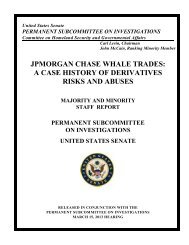JPMORGAN CHASE WHALE TRADES: A CASE HISTORY OF DERIVATIVES RISKS AND ABUSES
JPMORGAN CHASE WHALE TRADES: A CASE HISTORY OF DERIVATIVES RISKS AND ABUSES
JPMORGAN CHASE WHALE TRADES: A CASE HISTORY OF DERIVATIVES RISKS AND ABUSES
You also want an ePaper? Increase the reach of your titles
YUMPU automatically turns print PDFs into web optimized ePapers that Google loves.
109<br />
The SCP had never before experienced those types of sustained losses. According to<br />
CIO personnel, at the beginning of 2012, $5 million was considered a sufficiently large loss that<br />
the head of CIO, Ina Drew, would ask about it. 657 On February 29, 2012, the SCP book reported<br />
internally a daily loss of $15 million. CIO trader Bruno Iksil informed his supervisor, Javier<br />
Martin-Artajo, on that date that he had made some large trades, all of which experienced<br />
“adverse” price changes, and seemed to obliquely reference manipulating the marks as a method<br />
to limit the amount of losses reported, when he wrote that the trades had experienced “month end<br />
price moves that were all adverse although we could limit the damage.” 658 He also advocated<br />
analyzing “the lags we have in the core book.” 659 The “core book” was a reference to the SCP,<br />
which the traders often described as the “Core Credit Book.” According to the bank, the term<br />
“lag” referred to “the aggregate differential between the prices being assigned and the unadjusted<br />
mid-market price.” 660<br />
On March 9, 2012, in a recorded telephone conversation with Mr. Iksil, Mr. Grout<br />
expressed concern about how “we’re lagging,” predicting that the final outcome of the SCP<br />
trading strategy would be “a big fiasco” and “big drama when, in fact, everybody should have …<br />
seen it coming a long time ago.” 661 His use of the term “lagging” in the telephone conversation<br />
appears to have been a reference to the SCP’s ongoing, unreported losses. He cautioned: “We<br />
have until December to cover this thing. … [W]e must be careful.” 662 His supervisor, Mr.<br />
Martin-Artajo, later told the JPMorgan Chase Task Force investigation that their strategy was as<br />
follows: “We can lose money on a daily basis, but correct with carry of the book. 663<br />
Month-end<br />
657 Javier Martin-Artajo, head of CIO equity and credit trading, reported: “If we ever had a loss over $5 million, Ina<br />
calls me at night.” JPMorgan Chase Task Force interview of Javier Martin-Artajo, CIO (partial read out to<br />
Subcommittee on 9/6/2012). See also 2013 JPMorgan Chase Task Force Report, at 50, footnote 64.<br />
658<br />
2/29/2012 email from Bruno Iksil, CIO, to Javier Martin-Artajo, CIO, “Core credit book update”, JPM-CIO<br />
0003443. A later analysis by JPMorgan Chase’s Controller showed that, of 18 positions on February 29 examined<br />
to verify their values, five or nearly one third had used more favorable prices than the midpoint prices. See chart on<br />
February valuations, 5/10/2012 JPMorgan Chase Controller’s special assessment of CIO’s marks, January to April<br />
2012, JPM-CIO 0003637-654, at 653.<br />
659<br />
2/29/2012 email from Bruno Iksil, CIO, to Javier Martin-Artajo, CIO, “Core credit book update”, JPM-CIO<br />
0003443.<br />
660<br />
2013 JPMorgan Chase Task Force Report, at 47. The JPMorgan Chase Task Force defined the “unadjusted midmarket<br />
price” as “the mathematical mid-point between the best bid and best offer in the market.” Id. It also noted<br />
that “at times” some traders used the term “lag” to refer to “the amount by which the Synthetic Credit Portfolio was<br />
underperforming a theoretical or fundamental valuation of the positions – i.e., how far behind their expectations it<br />
was.” Id. at 48, footnote 57. For a longer discussion of the meaning of the term “lag,” see below.<br />
661<br />
See 3/9/2012 transcript of a recorded telephone conversation between Julien Grout, CIO, and Bruno Iksil, CIO,<br />
JPM-CIO 0003445-3456, at 3449. (“Mr. Grout: Here we’re lagging – we’re lagging. Well, you’ll tell me this on<br />
Monday and, and anyway, I see the impact very well. I have a vague idea you know how this is going to end up.<br />
You know that [indecipherable] Trevor is going to try to get some capital, Ina will say no, so it will be a big fiasco<br />
and it will be a [b]ig drama when, in fact, everybody should have, should have seen it coming a long time ago. ...<br />
Anyway, you see, we cannot win here. … I believe that it is better to say that it’s dead, that we are going to crash.<br />
The firm will service the debt. … It’s going to be very uncomfortable but we must not screw up. … It’s going to<br />
be very political in the end. … We have until December to cover this thing. … we must be careful.”).<br />
662<br />
Id.<br />
663<br />
“Carry” refers to the cash premiums that short counterparties were paying to the CIO as the long party on certain<br />
credit derivatives. Mr. Martin-Artajo seemed to be saying that the daily losses in the SCP book could be<br />
“correct[ed]” or lessened through the receipt of the cash premiums or “carry” from the short counterparties.



